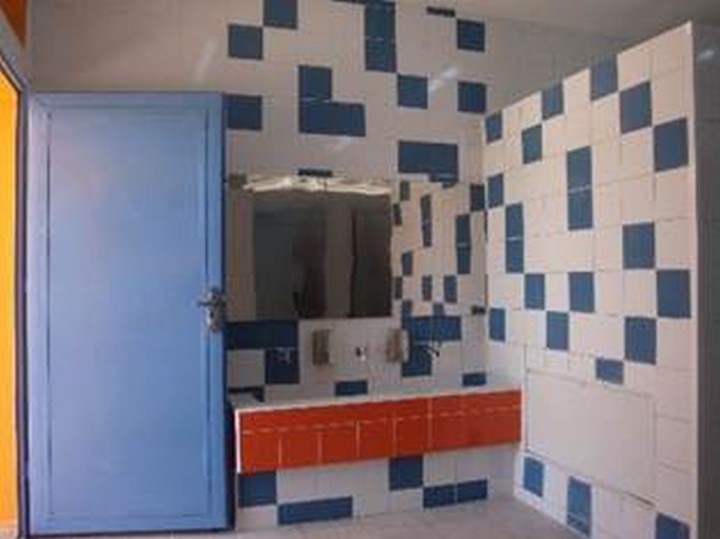Support to formal schools in host communities in a refugee context - Jordan
2015 - 2018 • Norwegian Refugee Council
Purpose
To improve WASH in schools in the host community in Jordan which have high enrollment of Syrian refugees
Activities
The project supports formal schools in the host community in Jordan which have high enrollment of Syrian refugees. The project has a 'hard' and a 'soft' component. The hard component entails expansion of schools with additional classroom buildings with integrated WASH blocks and playgrounds, as well as rehabilitation works. Where possible, the schools are outfitted with a solar panel system, covering the electricity needs of the school. The soft component contains, besides summer school, social cohesion and enrollment support activities, a 'maintenance, cleaning and hygiene awareness' programme.
The project has redesigned the traditional WASH blocks built in Jordan schools, focusing on durability, facilitating cleaning and child-friendliness. The central flush tank with push buttons in the cubicles allow for limited water usage for flushing (3 liters). Among other design adaptations are the use of louvers instead of windows and ventilators, elimination of flush tanks which are vulnerable to vandalism, protection of water taps against abuse and theft, and the use of colors in the WASH block.
The WASH blocks have as well a water conservation system, combining a greywater re-use system (water used for handwashing) and a rainwater catchment system. Both systems combined should save 60% of the freshwater used for flushing toilets and therefore should mitigate the additional operational costs of the increase of refugee students in the school. The water conservation system has gone through a thorough value engineering process, providing the cheapest solution with the highest impact.
The maintenance, cleaning and hygiene programme is implemented through a school manual featuring classroom activities in vandalism, tidying up, using WASH blocks, meeting the janitor and water conservation, among others. Moreover, the manual includes activities targeting school management and parents, and supports the janitors by providing new cleaning material.
The holistic approach of the project, including hard and soft activities and targeting students, parents, teachers and school management intends to have a lasting impact on the school, with improved facilities, durable in design and sustainable in maintenance, with mitigated operational costs and with behavioral change amongst its users.
The described project activities are part of a larger project supporting formal schools in host communities in Jordan which host large number of refugee students. Student populations often double, creating multiple challenges for school management: increased operational costs, pressure on cleaning activities, accelerated deterioration of infrastructure, hygiene issues as well as pressure on the quality of education and on the social cohesion among students.
The holistic approach of the project, with 'hard' and 'soft' activities, targets all these challenges, by giving substantial support to the school so to maintain and improve the quality of education and to provide a child-friendly and save space for children.
Images

Image: WASH block constructed in a formal school in Irbid district, Jordan
Countries of activity
Location of main activity
Objectives
The construction of the WASH blocks have as objectives to create durable and child-friendly sanitary facilities for the increased number of students. The water conservation system limits the increase in the operational costs related to the influx of refugee students in the school. The maintenance, cleaning and hygiene programme has as objective to improve preventive maintenance, improve cleanliness of the facilities and improve hygiene practices amongst the students. This programme should, even with an increased number of refugee students, assure that the schools remain child-friendly places.
Finally, by expanding host schools, the project benefits as well substantially the host community, which has a positive impact on the social cohesion in the neighborhood.
Further information
The project has currently expanded 7 schools and will expand a further 4 schools in Irbid Governorate, one of the governorates with the highest percentage of refugees in host communities.
The project is focusing on sustainability in terms of durability, scalability and behavioral change amongst its users.
The designs commonly used in Jordan have been adapted after a situation assessment identified the elements vulnerable to vandalism, theft, misuse and neglect of cleaning, in order to assure the durability of the infrastructure. The water conservation system uses an above ground water tank system, decreasing the costs -compared to underground concrete water tanks- considerably. The system, with its limited costs, can be included in every new expansion and school construction project. The maintenance, cleaning and hygiene project targets behavioral change within the school community, which should assure a longer longevity of the new and the rehabilitated infrastructure.
Contact information
Dominiek Benoot
Login to see the e-mail-adress of the contact person.
Filter tags
Behaviour change Camps (emergency or longer term) Health and hygiene International NGO Middle East & North Africa Operation, maintenance and sustainable services Other funding source or unspecified Public awareness, advocacy and civil society engagement Schools Specific to one or several countries Toilets or urinals (user interface)

Uploaded by:
SuSanA Admin (susanaadmin)















